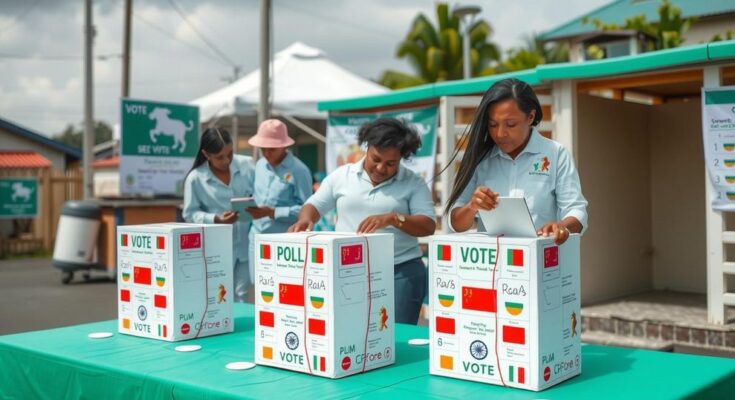Voters in Comoros are electing a new parliament, with allegations of electoral irregularities from opposition factions against President Azali Assoumani. Approximately 338,000 individuals are registered for the polls, and nearly 100 candidates are vying for seats in the 33-seat legislature. Critics express concerns about Assoumani’s concentration of power, particularly regarding his potential plan to transfer authority to his son. Opposition parties are divided on the strategy of participating in the elections versus boycotting them.
Citizens of Comoros are taking part in parliamentary elections for the archipelago’s 33-seat assembly, following President Azali Assoumani’s controversial re-election last year, which the opposition claims was tainted by significant irregularities. The ruling party has rejected these allegations. With nearly 338,000 registered voters, polling stations opened early on Sunday, marking the first parliamentary elections since January 2020. Almost 100 candidates were approved by the Supreme Court to participate, amidst concerns over Assoumani’s potential succession plan for his eldest son, Nour El-Fath. The current administration’s critics fear Assoumani is consolidating power and preparing to install his son as his successor following the end of his term in 2029. Some opposition factions, including the Juwa party, which is led by imprisoned former President Ahmed Abdallah Sambi, have called for a boycott of the elections. Despite this, others, such as the Hope of the Comoros party, advocate for participation as a means to expose the flaws in the current regime. Hamidou Karihila stated, “The Azali regime is weakened … by participating in these elections we are contributing to further exposing the flaws in its system and accelerating its inevitable fall.” Election results are anticipated by the close of the week.
Comoros, an Indian Ocean archipelago, has a complex political history characterized by coups and authoritarian rule. President Azali Assoumani first seized power in 1999 and has since won three elections, with his rule facing accusations of repression and manipulation. The recent electoral process has been shadowed by claims of irregularities in the 2022 presidential election, where Assoumani was re-elected. The current parliamentary elections are critical in determining the future political landscape, particularly with regard to Assoumani’s son potentially succeeding him. The participation and actions of various opposition parties underscore the tensions within Comorian politics, as many seek to challenge the ruling regime while others feel that boycotting the elections may be a more effective strategy.
The ongoing parliamentary elections in Comoros represent a significant moment in the nation’s political discourse, highlighting the divided opinions among opposition parties and the continuing dominance of President Assoumani’s regime. As citizens head to the polls, the potential influence of these elections on future governance and leadership transitions remains a focal point of national debate. The results, expected soon, will provide insight into the current public sentiment and the political momentum leading forward post-elections.
Original Source: www.stawelltimes.com.au




